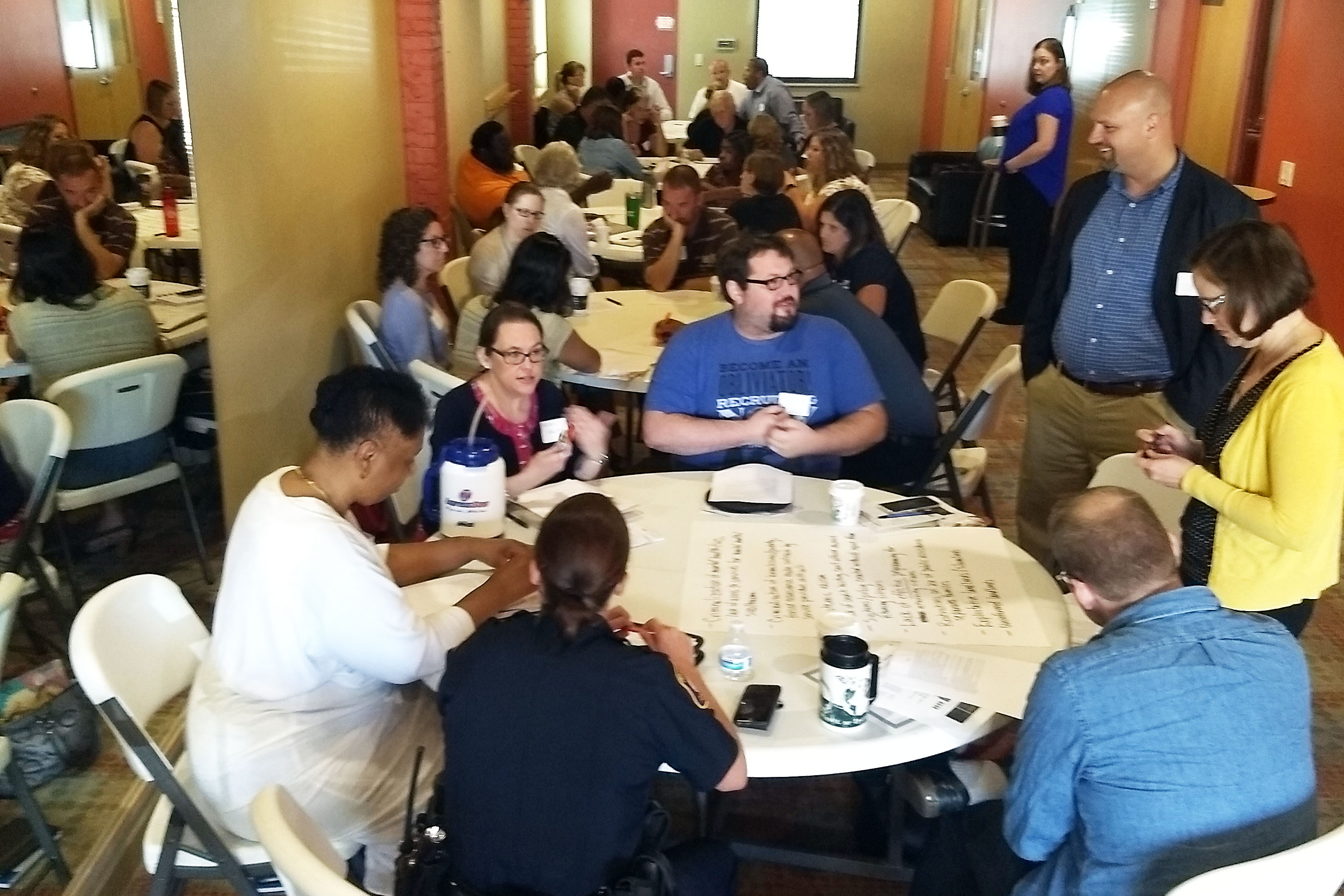Being released from prison should have been the end of a long, difficult chapter in Jarrett Ruffin’s life and the start of a much easier one. Instead, when Ruffin was released in 2003, he found a slate of new hurdles to cross, not the least of which was simply finding a safe place to call home.
The tasks of establishing oneself — such as finding a job and securing a place to live — can be difficult for anyone whose just starting out. But those tasks that can be monumentally difficult for someone who also carries the stigma of a criminal record.
“I was going from one friend to another for a place to stay. It’s what you might call couch surfing,” Ruffin said. “The problem is, eventually you run out of people to go to.”
Unfortunately, Ruffin’s experience is far from unique. Housing remains one of the largest challenges formerly incarcerated people face as they set out to create a life for themselves after prison. Ruffin joined about 30 other people Friday, Aug. 10, 2018, to discuss how housing challenges complicate re-entry efforts of formerly incarcerated people and impact the recovery efforts of crime survivors.
The Housing & Criminal Justice meeting in Grand Rapids was sponsored by Safe & Just Michigan and the Michigan Coalition Against Homelessness. It was one of a series of meetings SJM is holding with our partners to better understand the housing needs of the formerly incarcerated and crime survivors, to learn about the efforts of organizations focused on housing throughout Michigan and to talk about next steps to improve access to affordable and accessible housing.
 Ruffin’s experience is one shared by many people who have been released from prison, according to a 2012 Urban Policy Institute study that found that 80 percent of people released from prison were still living with family members within a few months of release.
Ruffin’s experience is one shared by many people who have been released from prison, according to a 2012 Urban Policy Institute study that found that 80 percent of people released from prison were still living with family members within a few months of release.
That’s a problem for people who come from families with few resources, or from families that might already be unstable or dysfunctional, Ruffin said.
“It used to be that you’d get out of prison and they’d be happy to see you. Now, they hate to see you coming,” said Ruffin, who has since secured housing.
The pressures of finding a job and securing a home can put immense pressure on a relationship, Ruffin said.
“(People) expect you to pay something on the rent, but there are so many barriers on employment that make it hard to find a job,” he said.
Formerly incarcerated people often find it difficult to secure employment and establish a home for themselves after release. Many employers and landlords hesitate to give them a chance because of their criminal records. Without a paycheck, it’s impossible to afford rent. But without an address, it’s difficult to get a prospective employer to take a job application seriously.
Other barriers to employment encountered by the formerly incarcerated include official roadblocks, including laws that prevent formerly incarcerated people from obtaining many occupational licenses needed for work in health care, service industries, skilled trades work and other fields of employment. Then there is the stigma that comes with having been incarcerated.
 “If I could change any one thing, it would be to educate the general public and landlords to get rid of the stigmas that surround formerly incarcerated people,” Grand Rapids Police Department Officer Ruth Walter said. She runs CLEAR — the Coalition, Leadership, Education, Advice, Rehabilitation Program for formerly incarcerated women.
“If I could change any one thing, it would be to educate the general public and landlords to get rid of the stigmas that surround formerly incarcerated people,” Grand Rapids Police Department Officer Ruth Walter said. She runs CLEAR — the Coalition, Leadership, Education, Advice, Rehabilitation Program for formerly incarcerated women.
“No one ever hears the success stories that come out of prison, and there are so many of them,” Walters said.
Plus, she pointed out, formerly incarcerated tenants can be among the most valued tenants a landlord could hope for. They are often supervised by parole officers, drug tested, held to employment requirements by their parole release and motivated to get their lives back on track.
Michigan prison recidivism — the measure of how many people return to prison after being released — was 29.8 percent in 2016, the most recent year for which numbers were available. That’s down from about 50 percent in 2006. But the public perception that about half of people — or more — who left prison will return to it persists, Walters said.
“I am working to change that perception, but it’s hard,” she said. “If (the formerly incarcerated) had support, everything else would fall into place, but they can’t do it on their own. They need a chance.”
It’s a sentiment echoed by Nate Johnson, the re-entry director of 70×7 Muskegon, a Muskegon-based ministry that helps people in his community find their footing again after release from prison. Johnson, himself formerly incarcerated, encounters struggles with homelessness constantly.
“I hear from guys who are situationally homeless and guys who don’t have family every week. It’s not that they don’t have aunts or uncles, but the family they do have isn’t stable,” he said. “If your parents don’t have anything, you don’t have anything.”
People like that don’t need to be feared or stigmatized, Johnson said. And they don’t need pity, either. What they need is fair chance to turn their lives around.
“They need an opportunity to change their lives, but people treat them like lepers. If they don’t get that opportunity, that’s when they get into drugs, into sexually transmitted diseases, into what’s on the streets,” Johnson said. “All of this can be solved. It’s about opportunity.”
Safe & Just Michigan is committed to a future where everyone feels safe in their communities, and access to safe, affordable housing is a cornerstone of that vision. That is why SJM is partnering with the Michigan Coalition Against Homelessness and other organizations to research barriers to housing faced by formerly incarcerated people and crime survivors and to create greater access to safe and affordable housing. The next Housing & Criminal Justice meeting will take place in Flint on Sept. 7.

